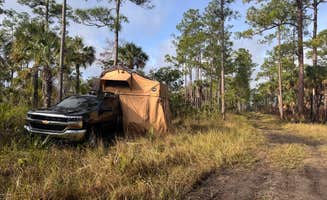Dispersed camping near Alva, Florida includes several undeveloped backcountry sites situated within subtropical wetland ecosystems. The region experiences high humidity with summer temperatures frequently exceeding 90°F and winter lows rarely dropping below 50°F. These primitive camping areas require self-sufficiency and environmental awareness, as most locations sit at elevations below 100 feet and can flood during seasonal rains.
What to do
Paddling adventures: Peace River Banks Backcountry offers extensive water-based recreation opportunities. Bob S. notes, "The Peace River runs north to south. Excellent backcountry camping between Zolpho Springs and Gardner. More camping down to Arcadia."
Wildlife observation: While camping in Big Cypress National Preserve areas like Nobles Primitive Camp, visitors encounter native Florida species in their natural habitat. Trevor G. describes the location as "old florida" with the camp "located next to marsh land," creating ideal conditions for wildlife viewing.
Stargazing: The remote nature of these camping locations provides minimal light pollution. Clear nights reveal excellent stargazing conditions throughout the year, especially during winter months when humidity levels typically decrease and skies remain clearer.
What campers like
Natural isolation: The remote setting of Peace River Banks Backcountry appeals to those seeking solitude. According to reviews, "Canoeing and kayaking are preferred mode of transportation but I've seen others use Jon boats and airboats. Camping permitted on West Bank. No designated sites."
Authentic wilderness: Visitors appreciate experiencing genuine Florida ecosystems without developed infrastructure. The primitive conditions require self-reliance but reward campers with unfiltered natural surroundings.
Vehicle accessibility: Despite being remote, some locations maintain reasonable access. At Nobles Primitive Camp, campers report, "Luckily the access road was drivable with two wheel drive," making these wilderness experiences more accessible than many might expect.
What you should know
Weather preparedness: Florida's subtropical climate means sudden afternoon thunderstorms are common from May through October. Lightning strikes pose serious risks in open areas, and low-lying terrain can experience rapid flooding. Checking weather forecasts daily is essential.
Water navigation skills: For river-based camping, basic paddling competency is mandatory. The Peace River contains submerged obstacles, variable current speeds, and occasional wildlife hazards including alligators.
Permit requirements: Many primitive camping areas require permits even when free. Research requirements well before departure as cell service is unreliable in most dispersed camping areas near Alva.
Tips for camping with families
Safety boundaries: Establish clear physical boundaries for children at unmarked campsites. The absence of defined campground borders means families must create their own safety perimeters, especially near water.
Insect protection: Florida's wetland environments harbor diverse biting insects year-round. Pack appropriate repellents, protective clothing, and consider mesh shelters for eating areas to make primitive camping more comfortable for children.
Educational preparation: Before visiting Nobles Primitive Camp, help children identify common Florida wildlife and plants. Trevor G. mentions the "Great remote drive out to the primitive site," which provides excellent opportunities to discuss ecosystem changes as you travel from developed to natural areas.
Tips from RVers
Vehicle clearance concerns: Standard RVs are unsuitable for most dispersed camping near Alva. Access roads frequently transition from "paved road turns to dirt/gravel" conditions requiring higher clearance vehicles.
Alternative base camps: Consider using developed campgrounds as base camps for day trips to primitive areas. This approach provides amenities while still allowing exploration of wilderness areas not suitable for larger vehicles.
Water crossing assessment: After rain events, approach water crossings with extreme caution. Florida's sandy soil can quickly become unstable when saturated, creating hazards for heavier vehicles attempting to access remote camping areas.


